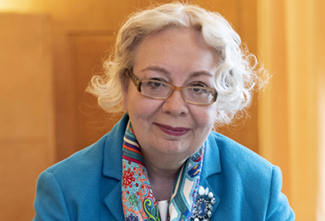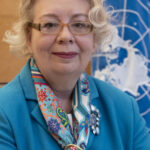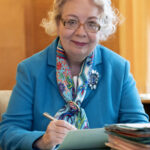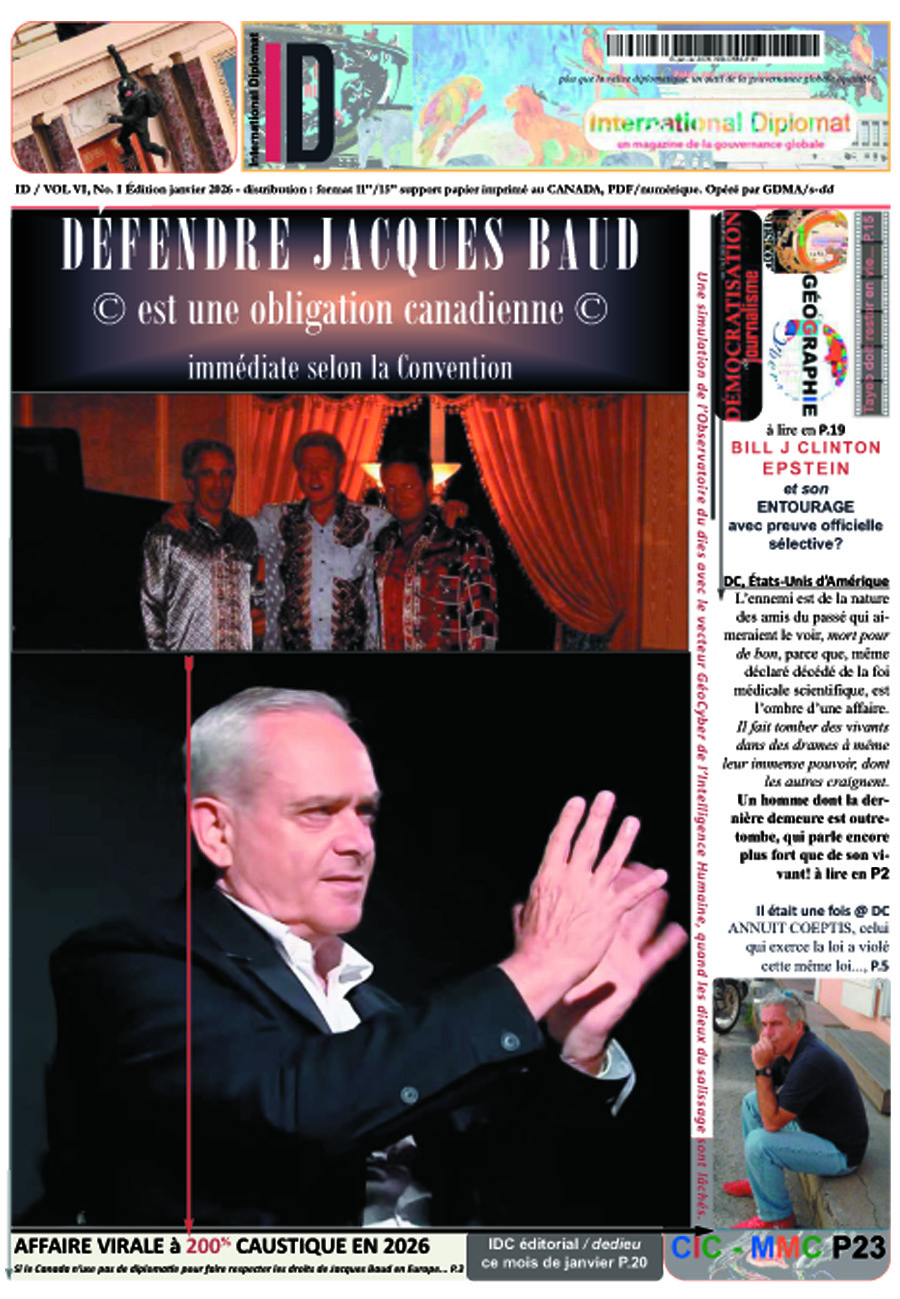
Interview with Ms Tatiana Valovaya Director General, United Nations Office at Geneva
She is the first woman to be Director-General of the United Nations Office Geneva, and she will be remembered in history for having shown to future generations of young women that everything is possible as long as you are focused, hardworking and persevering.
Ms Valovaya carries a considerable burden of responsibility on her shoulders and, despite her busy schedule in this challenging Covid pandemic reality, she took the time to answer our numerous questions. As one might expect, as most things, this encounter was also online, and the Director-General’s knowledge about the conference application TEAMS is impressive. Indeed, she was more adept at these online connections than the journalist sitting on the other side trying desperately to adjust the camera. One might think that somebody of her stature would be annoyed by this, but not the Director-General. She was patient and friendly.
Before we leave the space to the Director General, let us briefly mention that she has been a diplomat, a journalist and a well-known and highly respected economist with more than 35 years of international experience to her credit and, despite it all, she is modest and gracious. So, Director-General, over to you, please…
First of all, we would like to congratulate you on your photo exhibition. How did that come about?
In fact, it is not my photo exhibition but the Palais des Nations’ one. I just happened to be clicking on my camera. I’m not the important actor in this. It was during the first lock-down. We had closed the Palais to most of the people in order to prepare it for safe return and new working conditions for staff. Of course, I was coming to the Palais, checking on how things were progressing. It was the first time that I saw the Palais without people. Earlier, when I was in the Palais, it was always full of crowds, crowds of people everywhere… You could see people but not the architecture. I was overwhelmed by the Palais, by its architecture but also by its meaning. You know, I have been in many empty buildings, and sometimes you feel that emptiness. But here you did not feel the emptiness, the Palais was alive even without people. There is a lot of history here, and I was just thinking how important it was that, after the First World War right up into the Great Depression, members of the League of Nations sat together to find financial resources to build this palace for the multilateral organisation – and how important it is now. Since I love to take photographs, one day I brought my camera and took some pictures. Then I shared these pictures with some of my colleagues only to show how different the Palais looked.
Some of these photos were immediately used by the internal magazine produced by our staff, and then somebody showed them to the Centre de la photographie de Genève. That is how it was decided that it would be a good idea to show them online, to show them to the people of Geneva, so that they could see the beauty and the architecture of the Palais. It also served to remind that, although the Palais was not open to the public, life went on and the work continued. It was a time for reflection, a time to rethink and prepare for another round of international multilateral activities. It happened purely by chance and my role was not central. The Palais was the main character.
You are the first woman appointed Director General of the United Nations Office Geneva. How does it feel to be a forerunner and a role model for generations of women?
It is very important that the United Nations Office at Geneva is finally led by a woman. I’m the thirteenth Director-General and the first woman. It really shows how important gender parity is to the United Nations as an organization, how important it is to the Secretary-General. I think it’s important that at the top level in the organization, we now have gender parity. At the level of under-secretaries-general and heads of departments, we really are a balanced organisation.
I do not consider myself as a role model. When I was a young girl, we did have some female role models. These days it’s really the mainstream. We take it for granted that women should be at the head of international organizations. I think the ideal for young generations is not an individual female as role model, but the fact that we are equal, we are professionals, we can lead international organisations. This is going to stay. This is the generation of equality.
Do you think it is important to have a woman at the head of an international organization, country etc.?
Of course, it’s important! I really hope that my generation will see the day when it will not make news in the newspapers that this or that organization has finally had a woman named at its head. We should really take it for granted, as something normal. We should really reach a stage where it’s normal, nothing exceptional. Women make up half of humanity!
Your tenure occurs during highly unusual – even surreal – times such as have never been experienced at the United Nations, nor in the world. How has this affected your aspirations?
Well, of course, it has affected them because it is a new challenge that is added to our work. Really, we had to work very hard just to prepare the Palais for reopening: 164,000 square meters had to be prepared for the safe return of staff, delegates and conference participants. We had to think about lots of things. From the very beginning, we identified the need to impose a distance of two meters in the conference rooms, thought through how people should walk along the corridors, along the staircases. It was altogether an unusual experience. We also had to have a common response of the whole international Geneva in the interaction with our host country.
At the same time, it was immediately recognized that our agenda was more relevant than ever. We went on with all the issues that were on the agenda, for example the 75th anniversary of the United Nations, one of the key priorities for last year. We were very pleased and happy that we managed to implement all the ideas we had been discussing with my team at the end of 2019. We were able to carry out absolutely all of them, even if in a different, virtual format. For example, we had been discussing that we wanted to have a conference on the future of multilateralism and a dialogue with young people. We had three dialogues, in April, in June and then in October. We had fantastic participation, and not only by people in Geneva, but from many countries. We managed to carry out all our plans, albeit in a different manner; but our aspirations remained intact. We worked together in a unified manner to move forward the agenda of the United Nations.
Today, we are learning to live with the virus, even to “dance” with the virus, having events at the Palais, continuing the renovation work, and even finishing a construction project. What kind of experience is this turning out to be for you, and how are you managing to carry on your work?
- Official photo of Tatiana Valovaya, new director-General of the United Nations Office in Geneva. 5 August 2019. UN Photo / Jean Marc Ferré
- Official photo of Tatiana Valovaya, new director-General of the United Nations Office in Geneva. 5 August 2019. UN Photo / Jean Marc Ferré
My previous experience was one of working under stress, so I know I can work under stress, and I’m really prepared to do so. In the life of my generation, quite a few situations were challenging in my country. You had to take many relevant different decisions at the same time.
It was very good that I started my job here in August 2019, more than half a year before the pandemic. I started working with my team, learning about their capacities. When we were obliged to turn to virtual work, it was much easier for me to lead my team. It was and still is a very unusual experience, but we understand that even under these exceptional circumstances, we know that life can go on. We can always find a solution and always carry out our mandate.
Today, looking back, people are often comparing the current situation with that of the “Spanish flu”. But in a sense, there were very promising aspects to those times – WWI, “the war to end all wars”, was over and, what was more important, the League of Nations was being set up. So, actually, the previous pandemic coincided with the birth of the League. Do you see today the germs of any positive developments, any promising trends? And if so, could you elaborate?
I like history and it is necessary to know history well, and to learn its lessons. For me, it’s absolutely obvious that each time humanity confronts a global challenge as a result of catastrophe or tragedy, there is a determination to address it in a more unified way.
History shows that after World War I, the League of Nations was born. After World War II, the United Nations was born precisely to avoid a repetition of the tragedy that was the Second World War. This pandemic is not only a health issue, it’s an economic and social issue, really creating global challenges. I believe that it will generate a renewed interest in reinvigorating and further building the multilateral system.
When I say this, it is not only the lesson from history, it is also the result of the global conversation we had last year about the 75th anniversary of the United Nations, because ordinary citizens were asked: what is the future you want, and what is the role of the United Nations in this future? The majority of the people taking part in the survey, practically 90 percent, wanted more multilateralism and more United Nations.
For us, it is very important to have this support of the population. At the same time, we understand that we need to build better multilateralism, more inclusive, more integrated. That is what the citizens around the world want. So, I am pretty optimistic in this regard, and I hope the result of this pandemic will be a realisation that we live on the same planet, where we are all very interconnected.
All the challenges we are facing are global challenges, and if you have global challenges you have to have global solutions. To find a global solution, you need a multilateral system.
Regarding diplomacy after the pandemic, what is your vision? Is “online” diplomacy here to stay? What about the importance of “person to person” contacts, not just in the conference room, but in the corridors, outside the meetings?
I think all of us are looking forward to in-person meetings. One of the lessons from the pandemic is that we really need such meetings. Although virtual and hybrid tools are proving necessary now to go on with the cooperation, we really need meetings in-person. When you meet a person you can build confidence, you can build trust. Even if you do not always share each other’s views, you trust the other as a person, you can see her or his integrity.
At the same time, another lesson of the pandemic is that virtual and hybrid tools can give us additional benefits. Now we can include more actors in multilateral discussions.
Many small states that could not send their delegations to meetings here in Geneva are now participating virtually. Representatives from civil society and academia, who have been involved in all our virtual meetings, are really very important in making decisions.
So, I think the future will be hybrid: many meetings in person but quite often with additional hybrid elements which can enrich our discussions and really make possible inclusive multilateralism.
So, you think that there will be a combination of the two? The meetings will be in person and webcast at the same time?
No, not all the meetings. It depends upon the type of meeting. Quite a number of informal or highly sensitive meetings will still be only in-person. But there are quite a few events that are open and of interest to the public. If people can watch them online, it is very important also for the United Nations because people want to know what we are doing.
Before coming to Geneva, I worked in close collaboration with the United Nations and I knew a lot about it’s work. However, when I came here, I realised that I knew maybe only about 10 percent of what the United Nations is really doing. So, it’s important to allow people to see what we are doing and how important this work really is. I really think it will depend on the subject, on the type of meeting and on the organisers.
You are also Secretary-General of the Conference on Disarmament and the Personal Representative of the Secretary-General to the Conference on Disarmament. Is this a new experience and a new domain for you, and how do you perceive this responsibility considering that the Conference has been paralysed for so long? And in the context of the previous question, can issues on disarmament, often sensitive and usually confidential, be discussed online?
There was a period in my career when I was the head of the international department of the Government of the Russian Federation, and that covered all international issues. At that time, I was involved in all the items on the international agenda.
So, I was aware of the issue of disarmament. But at the same time, of course, I am in a new position, and for me it is very important, especially since I am a female. It is often said openly – and rightly – that the sphere of disarmament can evolve only through a larger participation of women. It is crucial, and we need a more balanced representation. When we are meeting, the majority of the ambassadors are still men. We need to change the situation.
At the same time, the Conference on Disarmament depends upon the consensus among the member states, so, we have to support them. It is a very difficult period now, we still cannot see enough trust among Member States, so, we have to support them and help them to build this trust. For me, what is really important is that all the members of the Conference value it and praise it as a body. It is the only multilateral body on disarmament, and although we cannot go on with our substantive decisions at the moment, we still hear from all members how important it is to go on and support the Conference on Disarmament.
This year, we had a virtual high-level segment on disarmament, with a very active participation, and I think it was a very important achievement.
Why do you think that disarmament is not so interesting for women?
It is interesting for women, but we need to build up their capacity. For instance, in the Office of Disarmament Affairs we have a lot of young women, and we see that in a number of delegations, there are already quite a few young women, but it takes time for them to grow up and reach the rank of ambassador. So, we have to promote women’s participation. The Secretary-General is really showing the example. In our United Nations system, there are quite a high number of females in key positions in the disarmament area.
What is your vision of the future of Geneva as a diplomatic and conference centre? Will its role be strengthened, or, on the contrary, will the move online leave it weakened?
I really hope it will be strengthened. Why? Again, as a result of the pandemic, we see how important in-person meetings are. We really see that Geneva is a very important place for this kind of meetings. We are really proud of our work during the pandemic. We had Libya talks that brought about a ceasefire. We had discussions on Libyan political and economic issues. We had a conference on Afghanistan, resulting in pledges reaching 3.3 billion USD. We had the continuation of the inter-Syrian dialogue. We had the Geneva International Discussions’ meetings. The Secretary-General is planning to convene informal talks on Cyprus at the end of April.
We understand that there will also be significant hybrid and virtual meetings in the future. We are building our capacity here in Geneva to provide support for this kind of conference activities, to be able to provide technical support and multilingual interpretation for hybrid events. If we combine these two elements – preserving and strengthening our traditional role, developing the new elements – we will really be able to strengthen our role and place.
Speaking about writing and the media, what are your favourites – periodicals, magazines, newspapers, online and in print? And who are your favourite writers (world literature), the real masters of the pen, be it in Russian, in English or in another language?
In Moscow, I have a huge library, and I buy books like a “bookaholic”. I am afraid that books one day will stop being printed, therefore I keep on buying. When I used to travel to New York, London or Paris, I always returned home with a suitcase full of books. I think I have enough books to last to the end of my days.
These days, because I could not bring my library here, I mostly read online. I read newspapers. I start my day reading news from different sources, Russian, British, U.S., French… I have been reading more and more nonfiction. I’m really very interested in history, and I think it’s a very important subject.
I’m now reading a lot about the history of Switzerland, Geneva and the Palais des Nations. It is very interesting for me to understand what was built and why, and how negotiations took place. Lots of things took place here in Geneva which are connected with my native country, Russia. Speaking about writers: I love Russian literature, but I had to read it at school, so my favourite writers were those I did not have to read for school purposes. I have always had two favourite writers: Balzac and Dreiser. They are still very important for me. Speaking about Russian literature, I really love Russian poetry, not only Pushkin but also the so-called Russian poetry of the Silver Century. What is interesting in this period, is that many prominent poets are women. There are two absolutely fantastic poets of the end of the 19th and beginning of 20th century: Anna Akhmatova and Maria Tsvetaeva.
What hobbies do you have – photography, music, plastic arts, painting…?
I would say that my main hobby in normal times is travelling, and as a result of that and because one likes to keep memories, I like photography. I’m also interested in painting, and I write.
As you may be aware, I started my career as a journalist, and I have written a book on the history of Europe. So, I have quite a number of hobbies as a result of my travels and my curiosity to learn about people and how they live around the world.
What kind of paintings do you like?
My favourite painters are the French impressionists. This does have an explanation: in Russia, we have absolutely fabulous collections of French impressionists. At the time when they were not well regarded in France, several Russian collectors were overwhelmed by these paintings and started buying them. That’s why we, in Russia, have a fantastic collection of impressionists. When I was a young girl going to the museums, I fell in love with these painters: Monet, Manet… Speaking about Russian painters, my favourite painter is one who belongs to the beginning of the 20th century, but he is different in style. His name is Nikolai Roerich. He was also a philosopher, and a person who worked for universal values. After the Revolution, he was trapped in Finland and lived and died in India. His paintings are amazing, as well as his philosophical and political heritage, including the “Roerich pact”.
And now back to politics. Who, throughout history, is the most inspiring figure for you in the realm of politics?
It is Thomas More. I read his books when I was a very young girl, and then later when I was still quite young. My parents asked me to write an essay on him because they were writing about him and some other philosophers of this period. They needed my support because there were a lot of materials in English and not enough in Russian. At that time, I was about 18 years old, and I really fell under his spell. He was a person of high moral principles, who also gave his daughters a very good education. He was a real Renaissance figure, and for me he was a real statesman and a politician.
And the final question… Imagine the situation: the pandemic is over. It is “the day after”. How do you imagine yourself in your post of Director-General of the United Nations Office at Geneva? Will you pick up where we left off, aiming to accomplish the same aspirations that were interrupted or disrupted by the pandemic, or do you see a major refocusing, or perhaps something in between? Have you already entertained thoughts along these lines?
You should never go back. You should always go forward. Forward for me is to strengthen what we already have here. Geneva is a centre of international conferences, a centre which provides support for multilateral negotiations and meetings. We also have to look forward and use new conference tools to build inclusiveness in multilateral organisations and to do more to achieve the sustainable development goals, work for peace and security, and for human rights. I really hope that, once we overcome the pandemic, we can do it in solidarity. That will give us a certain assurance. If we really show solidarity, we can face any global challenge, wherever it is. There are quite a number of challenges – let us not forget about the climate crisis. We are not speaking as much about the climate crisis these days because we are talking more about the pandemic, but the climate crisis is there; and we should use our experience of finding global solutions during the pandemic to really address other global challenges, including the climate one. •
- MF
- April 2021
- UN Photo / Jean-Marc Ferre







